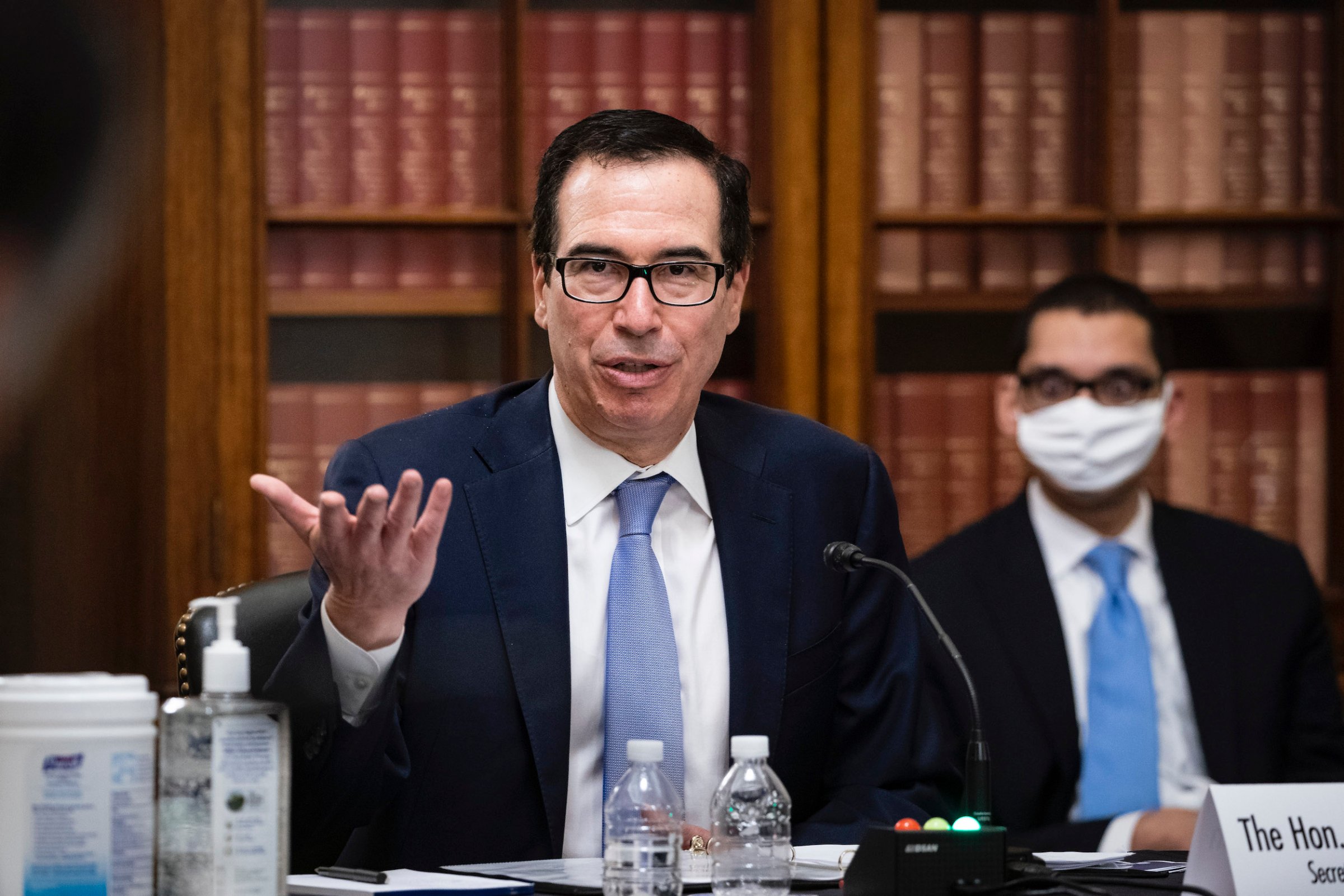
The Trump administration doesn’t plan to release details about companies that received billions of dollars through a high-profile federal coronavirus-relief initiative, Treasury Secretary Steven Mnuchin said this week — reversing earlier guidance.
The Trump administration believes names of borrowers from the Paycheck Protection Program and the amounts they receive are “proprietary,” and “confidential” in many cases, Mnuchin said Wednesday during a Senate committee hearing.
But the applications for PPP loans, which are forgivable if borrowers meet certain criteria, say such data will “automatically” be released. Moreover, the Small Business Administration, which oversees the lending program, told Bloomberg News in April that such loan-specific information would be made public “in the near future.”
The apparent reversal on disclosure comes amid troubling signs for oversight of the $2.2 trillion pandemic relief package that Congress approved in March. The Government Accountability Office, which is responsible for preparing a required report on the spending by the end of June, has requested loan data from both the PPP and a separate program for economic “disaster” loans, but has not yet been told when the request will be honored, according to spokesman Chuck Young.
“We are extremely disappointed to learn that GAO has had the same problems that we have had, and has not gotten the information they need to carry out their oversight function in the executive branch, as well as the difficulties we have in the legislative branch,” Senator Ben Cardin of Maryland, the top Democrat on the chamber’s Small Business & Entrepreneurship Committee, said during Wednesday’s hearing.
Mnuchin’s position on disclosure also raises the stakes for a court battle between the administration and 11 news agencies, including Bloomberg News, which have sued to make details about PPP loan recipients public.
Salary Concerns
On Thursday, a Treasury spokesman said Mnuchin’s position reflected concern that publishing “loan-level” data with borrowers’ identities would risk disclosing proprietary information about millions of small businesses, and the salaries of sole proprietors and independent contractors. That’s because PPP loan amounts are calculated using the applicants’ payrolls. A spokesman for the SBA didn’t immediately respond Thursday to questions about the issue.
The SBA routinely releases borrower details from its other loan programs, including one that Congress expanded to create the PPP. But Mnuchin said Wednesday that the new program is different.
“As it relates to the names and amounts of specific PPP loans, we believe that that’s proprietary information,” he said. “And in many cases for sole proprietors and small businesses, is confidential information.”
The PPP loan application warns borrowers that “subject to certain exceptions,” their company names, loan amounts, and other information are public records “that will be automatically released” under the federal Freedom of Information Act, or FOIA. And the SBA’s website says that company names and loan amounts are public records.
Already, Bloomberg News and 10 other news organizations have sued the SBA in federal court in Washington, asking a judge to order the release of PPP loan records. That lawsuit was filed after Bloomberg News requested such records under FOIA in April.
In response to Bloomberg’s request, an SBA administrator wrote on April 26: “In the future, we will be able to turn our efforts to providing loan specific data to the public, but hope that all understand the need for the Agency to focus its efforts fulfilling the needs of the small businesses.”
Changing Responses
By May 5, in responses to subsequent FOIA requests, the agency had dropped any pledge of “loan specific” transparency. The agency’s later responses merely noted its website provides some statistical information about the PPP. More than 4.5 million small firms have been approved for loans totaling $511.6 billion, according to the SBA, which has released only loan totals and amounts by state, certain industries, size of loan and size of lender.
The PPP has generated criticism after some relatively large, publicly traded companies such as Shake Shack Inc. and AutoNation Inc. disclosed that they’d received aid, while millions of smaller businesses were still waiting for loans. Others questioned the program’s usefulness, saying federal rules about how to use PPP money were too restrictive. Congress loosened the rules earlier this month.
The PPP was the centerpiece of a $2.2 trillion coronavirus spending bill passed in late March. That bill contains conflict-of-interest rules prohibiting aid to companies owned by top U.S. officials and family members, including the president, administration officials and members of Congress. Those rules don’t apply to the PPP.
More Must-Reads from TIME
- Cybersecurity Experts Are Sounding the Alarm on DOGE
- Meet the 2025 Women of the Year
- The Harsh Truth About Disability Inclusion
- Why Do More Young Adults Have Cancer?
- Colman Domingo Leads With Radical Love
- How to Get Better at Doing Things Alone
- Michelle Zauner Stares Down the Darkness
Contact us at letters@time.com